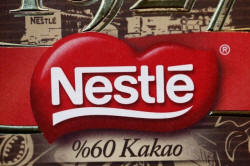|
 Nestle
to switch to cage-free eggs in U.S. by 2020 Nestle
to switch to cage-free eggs in U.S. by 2020
 Send a link to a friend
Send a link to a friend
[December 22, 2015]
By Anjali Athavaley
NEW YORK (Reuters) - Nestle SA said on
Tuesday it will stop using eggs laid by caged hens in its U.S. products
by 2020, making it the largest packaged food company to go cage-free
amid pressure from consumers and animal-rights groups.
|
|
The world's largest food maker said it uses about 20 million pounds
of eggs annually in products like Toll House cookie dough,
Haagen-Dazs ice cream and Stouffer's breakfast items. Currently,
none of Nestle's U.S. egg supply is cage-free, Paul Bakus, president
of U.S. corporate affairs, said in an interview.
The decision comes at a time when the food industry is under
pressure from groups including the Humane Society of the United
States, Mercy for Animals and World Animal Protection, which have
successfully lobbied many companies to adopt animal welfare
practices.
Companies have also said consumers are paying more attention to how
the food they buy is made, prompting industry to change its sourcing
of ingredients.
Bakus said the transition to cage-free eggs is backed by Nestle's
current suppliers and the change is not expected to significantly
increase the cost of eggs for Nestle. The United States is Nestle's
biggest market.
"At this point, we're not planning on passing through any costs
associated with this to our consumers because we're hopeful the
costs will be minimal," he said.
Both General Mills Inc and Kellog Co said earlier this year they
will source 100 percent cage-free eggs by 2025.
Fast-food companies have made similar announcements. McDonald's Corp
said in September that its 16,000 U.S. and Canadian restaurants will
serve only eggs laid by cage-free chickens within 10 years while
rival Burger King has committed to using only cage-free eggs by
2017.
"When the world's largest food company speaks, their suppliers
listen," said Matthew Prescott, senior food policy director of the
Humane Society of the United States, of Nestle's announcement. "In
the short term, any egg producer would have to be out of their right
mind to build a facility with cages."
He added, "What we hope Nestle will do is extend the timeline to the
rest of its supply chain worldwide."
Bakus said Nestle had prioritized making the transition to cage-free
eggs in the United States. International markets have separate
supply chains, making it harder for them to commit to the same
timeline, he said.
(Reporting by Anjali Athavaley; Editing by Leslie Adler)
[to top of second column] |

[© 2015 Thomson Reuters. All rights
reserved.] Copyright 2015 Reuters. All rights reserved. This material may not be published,
broadcast, rewritten or redistributed. |